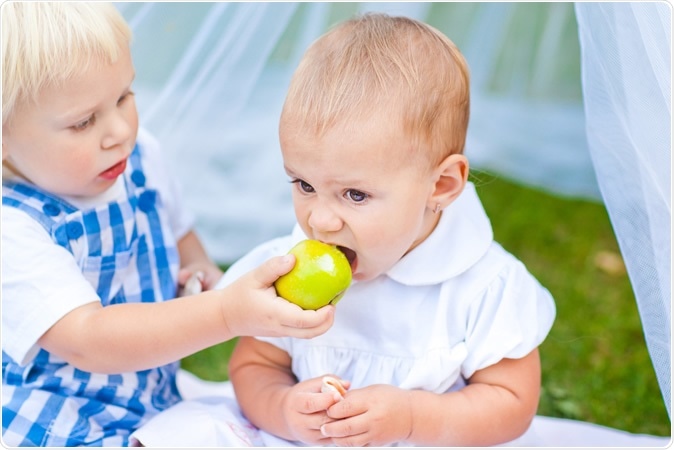
Image Credit: Iryna Prokofieva / Shutterstock
Altruism is an aspect of human living that is almost unique in its existence in this species. Society as such depends on this quality for its moral character, failing which humanity would be nothing more than a greedy, selfish crowd of individuals without law or moral standards.
And since food is a basic and compelling human need, altruism is perhaps nowhere tested more deeply than when it comes to giving away the food, we ourselves need. As adults, humans set up food donations, food banks, food funds and personal unplanned generosity. But when and how does this spirit start?
While nonhuman primates do cooperate for a common goal and share what they have when forced to survive in conditions of scarcity, they refuse to give to another chimpanzee, for instance, appealing food when they are themselves in need of food. Self-interest still operates at this level of intelligence.
Researcher Rodolfo Cortes Barragan says, “We adults help each other when we see another in need and we do this even if there is a cost to the self. So, we tested the roots of this in infants.”
The study
Setting 1
The study was conducted on a group of about 100 babies about 19 months old. They were exposed to colorful and sweet fruits that children typically like, such as grapes, bananas and blueberries. The child and the scientist were placed across a table, and the child was shown a piece of fruit in the researcher’s hand. This was then tossed gently or dropped ‘accidentally’ by the scientist to land on a tray that was near the child but out of reach for the adult.
In the test group, the adults then acted as if they were trying to reach the ‘dropped’ fruit but couldn’t. In the control group, the adults showed no expression, nor did they try to get the fruit back.
Setting 2
The experiment was repeated, this time with different children who were brought to the center just before their usual mealtime or snack time, and therefore likely to be hungry. The rationale was that this would make it harder for the children to be helpful at the cost of ignoring their own hunger. In other words, the children would now have to deal with the urge to eat the fruit themselves rather than hand it over to the adult.
The findings
In the first experiment, the scientists found that when the researcher was seen to be trying to get the fruit, the child more often than not picked up the fruit and gave it back to the researcher. However, in the control group, only 4% of children did so.
Surprisingly, even with the higher cost of generosity in the second experiment, about 37% of the test group children offered the fruit to the researcher, but none in the control group. True, the children in the test group looked at the fruit with an apparent desire to eat it, but then they gave it back.
Co-researcher Andrew Metzoff says, “We think this captures a kind of baby-sized version of altruistic helping."
Interestingly, the rate at which infants showed this helpfulness remained unchanged from the first time to the latest time the experiment was done, even when the same set of children was used. This shows, the scientists think, that children did not need to learn altruism during the study. Instead, they were ready to help people unknown to them, and from outside their immediate family, not once but multiple times, and without being urged or asked.
Some children were especially likely to do this, however. This included those with siblings and those from certain cultures. This could show that while children do have an inborn tendency to help those in need, this can be trained into a higher level of expression by their environmental stimuli as well. Older research has shown that adults with certain cultural environments in which interdependent living is encouraged do better at helping. Interdependence means placing priority on the level of connectedness with others.
And interestingly, an earlier study in 2014 shows that even a brief but pleasant relationship such as few minutes of playing ball while talking with a child primes the child to perform helpful acts towards the other person. The same helpfulness is present but at a much lower level, from a half to a third, of that seen in the first setting. The results were interpreted as indicating the possibility that playing with a child builds a sense of trust in the other person within the child. This in turn makes it easier for the child to learn that person’s culture, developing better behavioral and social patterns.
Conclusion
Barragan observes: “We think certain family and social experiences make a difference, and continued research would be desirable to more fully understand what maximizes the expression of altruism in young children. If we can discover how to promote altruism our kids, this could move us toward a more caring society.”
Journal reference:
Barragan, R.C., Brooks, R. & Meltzoff, A.N. Altruistic food sharing behavior by human infants after a hunger manipulation. Sci Rep 10, 1785 (2020). https://doi.org/10.1038/s41598-020-58645-9